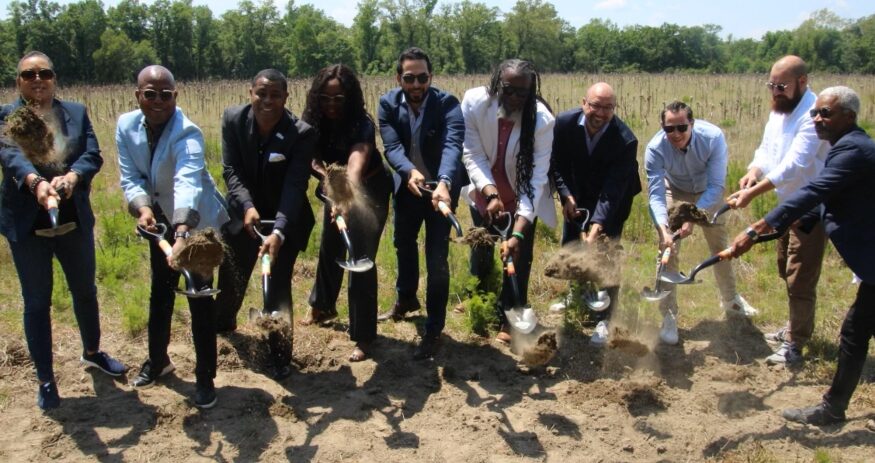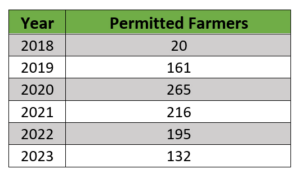
Bright Ma Farms of Charleston also has hemp-producing operations in Berkeley's County's Cordesville community. (Photo/BrigtMa Farms)

Bright Ma Farms of Charleston also has hemp-producing operations in Berkeley's County's Cordesville community. (Photo/BrigtMa Farms)
Applications for hemp growing permits on the decline
Jenny Peterson //February 6, 2024//
Hemp could not legally be grown in South Carolina until 2018. While there was an initial surge in applications from famers — over the past six years, at its height, 256 permits were issued statewide — the number of permit applications dwindled to 132 last year. Applications are currently being accepted through the end of February for permits for 2024 and the state says it’s too early to tell how many applications it will receive.
Charleston County, which peaked at 26 permits in 2020, had just seven permits in 2023, according to data from the Department of Agriculture.
Richland County followed the same pattern, with 26 permits in 2020 and seven in 2023. Seventeen permits were issued in Horry County in 2020 and just three in 2023.

The counties with the largest number of permits for 2023 were Orangeburg County with 11 permits and Anderson County with 12 permits, although those numbers are slightly down from the number of permits issued in those counties in the year 2020.
“In general, there was a lot of broad interest in hemp farming during the first years of the program, but things have settled down,” said Eva Moore, communications director for the South Carolina Department of Agriculture, which processes applications and issues permits. “The nationwide market for hemp grown for CBD got saturated very quickly, and farmers had to decide whether it made financial sense for them to stay in the business.”
Harold Singletary, founder and CEO of BrightMa Farms based out of Charleston with a growing facility in Cordesville in Berkeley County, said the dip in hemp farming permits could be due to common hemp strains not growing well in the South Carolina climate. He said statewide regulations that prohibit the sale of hemp “flower” within the state may also be a factor. Flower comprises the green leafy substances commonly used for smoking, and is the money-maker of the crop, according to growers.
“You can go into many dispensaries in the state that sell flower, but none of them have South Carolina hemp flower because our state says it’s not legal to do so,” Singletary said. “It’s overly regulated and not as big money maker as everyone thought it would be.”
Moore said the department is hopeful that a hemp being grown for fiber, manufacturing and other industrial uses — rather than for human or pet consumption — will emerge as a better option.
“In the future, we would like to see the market continue to evolve toward providing more opportunities for growing hemp for fiber,” Moore said.
BrightMa Farms is poised to be the leader in hemp production for industrial uses.
Singletary has an ambitious and revolutionary business model for hemp to be grown and processed large-scale to be used in advanced manufacturing and by major automotive companies to replace plastic, textiles, fuel — even concrete.
BrightMa has broken ground on a $50 million BrightMa Innovation Center processing facility in Orangeburg, in collaboration with many statewide and academic partners, and has hired European geneticists to develop the ideal strain of hemp that can be grown in the South Carolina climate, removes all tetrahydrocannabinol (THC) components and yields a taller, stronger and more fibrous crop suitable for industrial uses. THC is the chemical responsible for many of marijuana’s psychoactive effects. Currently South Carolina hemp is not allowed to exceed 0.3% on a dried weight basis of hemp, or else the state can burn the crop.
Singletary is already working with existing farmers statewide, including many black farmers, on adding BrightMa’s hemp strain to their fields as a secondary crop in order to test the yield for its industrial ability as well as a way to support small farmers.
“We’re talking about disruption into a market — plastic, fuel, textiles; we could bring a solution to climate change. I’m thankful to test-drive the dream,” Singletary said. “We continually put genetics in front of all of our verticals. Our goal is to impact yield and make sure THC is not a concern so that the farmer doesn’t have to worry about burning his crop based on THC levels.”
Overregulation concerns
Singletary hopes the state eases regulations for farmers working with BrightMa or others who are growing for commercial purposes in order for the industry to thrive.
“If it’s being grown for fiber and not for human or livestock or pet consumption, why is it to be regulated the same when it’s for commercial? What if the hemp is being grown to make paper? With more flexibility, there would be more access to have a range of hemp used for climate smart technologies.”
BrightMa continues to advocate for the industry and move forward with its processing facility, touting their industrial hemp as a seed-to-manufacturing product. Their patented strains and crops grown from local farmers aim to provide a climate-friendly materials solution that will be able to replace fiber, plastic and more in a sustainable way.
“The first BrightMa products should be online in 2025,” Singletary said.
C














